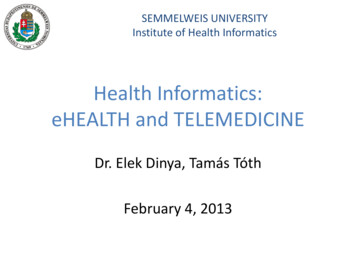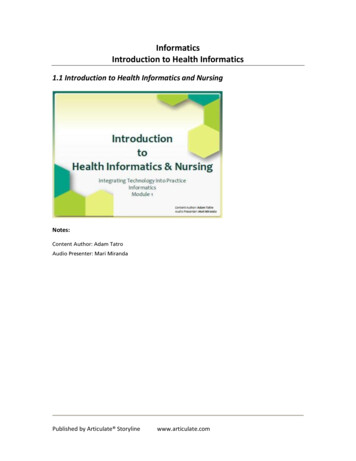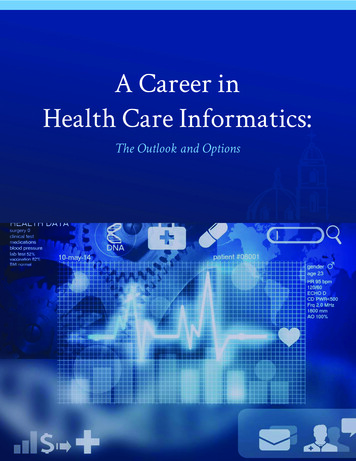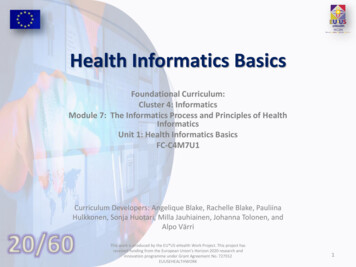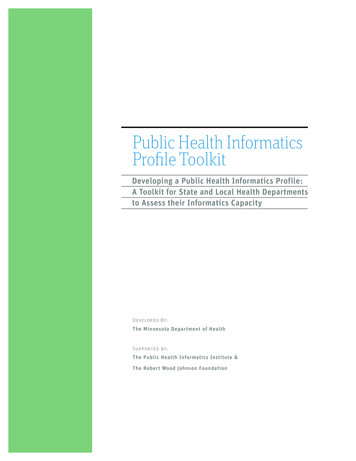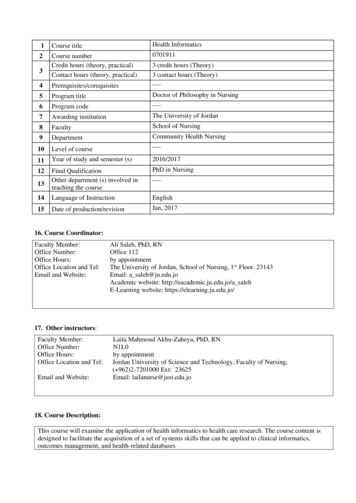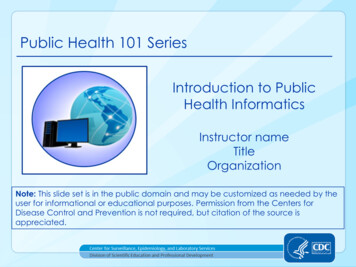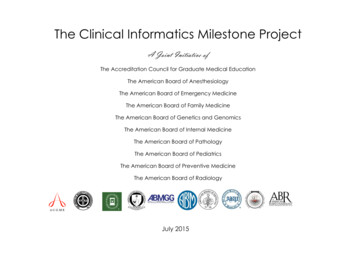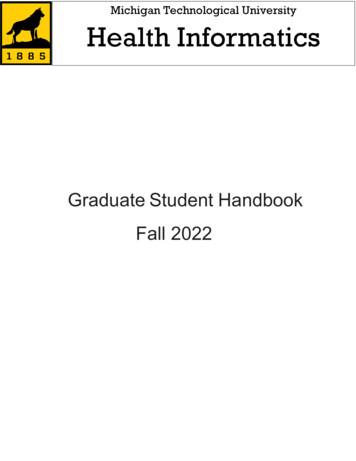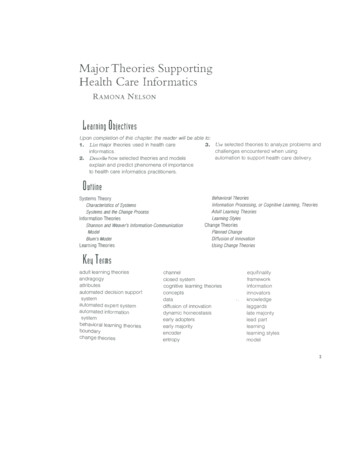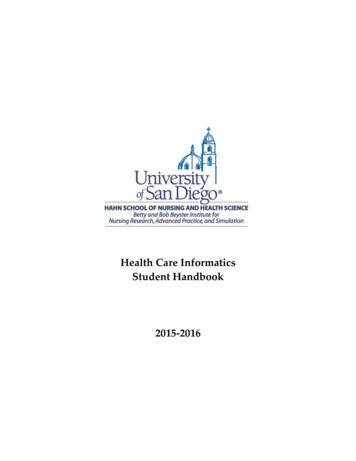
Transcription
Health Care InformaticsStudent Handbook2015-2016
1TABLE OF CONTENTINTRODUCTION.3HSON HANDBOOK REVIEW FORM .3PHILOSOPHY OF THE SCHOOL OF NURSING AND HEALTH SCIENCE .3MISSION STATEMENT .4GOALS AND OBJECTIVES .4Core Values of the HSON .5Program Outcomes for Students in the MS and MSN: HCI Programs .5ACCREDITATION/APPROVAL .6HCI TRACK CURRICULUM .6HCI MSN Program Plan .6HCI MS Program Plan .7COURSE DESCRIPTIONS FOR HCI PROGRAM .7Capstone Project Description .11ESSENTIAL ABILITIES AND PROFESSIONAL CONDUCT POLICY (EAPC) .12PROCEDURES TO FOLLOW IF STUDENT FAILS TO MEET EXPECTATIONS .16REMEDIATION PLAN FOR STUDENTS IN A SIMULATION LAB TESTINGEXPERIENCE .18STUDENT ADVISING AND REGISTRATION .19MSN HCI Nursing Program Administration .19CERTIFICATION .19HEALTH REQUIREMENTS .20Criminal History/Background Check .20INFORMATION TECHNOLOGY REQUIREMENTS .21Minimum Laptop Specifications for ExamSoft .23Handheld Electronic Devices Policy .27Electronic Mail .28OTHER INFORMATION .28Financial Assistance .28Student Employment .29Student Health Insurance Plan .29Student Organizations .30Conferences and Conventions .31POLICIES AND PROCEDURES.32Student Representation .32Course and Faculty Evaluations.32Attendance Policy .32Grading Policy .33HSON Grading Scale .341
2Course Repetition Policy .34USD POLICIES AND PROCEDURES .34Academic Integrity .34Non-Discrimination .36Harassment .37Grievance Policies.39Graduation/Completion of Degree Requirements .39UNIVERSITY RESOURCES .39SCHOOL OF NURSING RESOURCES .42APPENDIX I – Student Health Requirements .46APPENDIX II – Certificate of Good Health.49APPENDIX III – Release of Information.50APPENDIX V – Required Computer Skills .52APPENDIX VI - Notification for a Written Warning .53APPENDIX VII – Student Expectations and Improvement Plan .54APPENDIX VIII– Incident Report .56APPENDIX IX – Capstone Project Approval Form and Guidelines .60APPENDIX X- Handbook Review Form .632
3INTRODUCTIONThis handbook is intended to provide information for the MS and MSN HealthCare Informatics (HCI) programs at the Hahn School of Nursing and Health Science(HSON) at the University of San Diego. Students are responsible for the informationcontained in this handbook, the Archways Student Handbook and the University of SanDiego Graduate Bulletin. Refer to the Graduate Bulletin and this handbook to ascertainimportant dates and information.It is the individual responsibility of the student to keep abreast of any and allchanges made in the aforementioned catalogs and handbooks. This includes any and allpenalties that may be incurred due to failure to adhere to an established policy orprocedure. (Additional information can be found on-line in the Archways StudentHandbook under Student Code of Rights and Responsibilities). The hope is that theinformation provided in this handbook contributes to an enjoyable and successfulpersonal and academic journey for you at USD.HSON HANDBOOK REVIEW FORMAll students are required to read the Student Handbook, abide by the policiesand procedures written in the Handbook, sign the Handbook Review Form in theback of the book, and return it to the Master’s and International Nursing Officewithin one week of receipt of the book.For additional questions or clarification regarding this policy, please contact theMaster’s and International Nursing Office at 619-260-7608. Failure to comply with thesigning of this form may result in dismissal from the program if the situation warrantsit.PHILOSOPHY OF THE SCHOOL OF NURSING AND HEALTH SCIENCEThe faculty of the HSON views individuals as unique holistic beings in dynamicinteraction with an ever-changing environment. Each person has the potential for selfdirection and self-actualization. The faculty believes clients have the right to engageactively in decisions relative to their health and health care. An individual’s potential isachieved through interaction with larger systems such as the family, community, andsociety.Health is a dynamic state of being which is self-perceived and delineated bycertain empirical parameters. This state of being is positively or negatively influencedby interactions with the environment, including the health care system. The facultybelieve the health needs of clients are best served by a delivery system that is innovativeand responsive to the needs of all people.Nursing is a scientific discipline, which engages in scholarly inquiry to expandits body of knowledge as a foundation for excellence in clinical practice. Nursing care isthe translation of intellectual effort into humanistic interventions, which respect the3
4dignity, and worth of each person throughout the life span. Implicit in nursing practiceis accountability to individuals, families, and communities to promote, maintain, andrestore health.The faculty believes that learning is a continuing process that involves changes inknowledge, attitudes, and behaviors. Consistent with this belief, the faculty provideslearning experiences that foster critical thinking and believe that students areaccountable for their own learning. The faculty believes that they have a responsibilityto assist students to advance in the community of nursing scholars.The faculty of the HSON exemplifies, through teaching, research, and clinicalpractice, the personal and professional characteristics they seek to develop in theirstudents. They serve as catalysts for students’ learning, contributors to nursing’sexpanding body of knowledge, and role models in clinical practice.MISSION STATEMENTThe mission of the Hahn School of Nursing and Health Science, in keeping withthat of the university, is to prepare graduates committed to an ongoing search for truthin the context of intellectual openness. This commitment is fostered by teachingexcellence and values-based curriculum, which emphasizes the dignity of theindividual. The intent of all programs is to graduate individuals who exhibit excellencein clinical practice, a multicultural perspective, and appreciation of the needs ofvulnerable populations. Students and faculty share responsibility for the developmentof collaborative partnerships with one another, the community, and society at large. It isalso part of the mission of the school to provide a learning environment that addressesthe needs of the whole student. This effort is supported by the facilities and services ofthe larger university as well as by interactions between students and faculty. Finally, itis the purpose of the school to support scholarly endeavors that contribute to socialchange in ways that foster health.GOALS AND OBJECTIVESThe HCI MS and MSN programs support the University’s mission andphilosophy by preparing students to work with diverse groups through its emphasis onhealth care for vulnerable populations. Faculty are committed to teaching excellenceand a values-based curriculum, continuing to emphasize the value and dignity of eachindividual. The intent of all programs is to graduate masters-prepared iformaticianswho are individuals that display excellence, a multicultural perspective, andappreciation of the needs of vulnerable populations. Students and faculty equally shareresponsibility for the development of collaborative partnerships with one another, thecommunity, and society at large. The HSON is prepared to provide a learningenvironment that addresses the needs of students. This effort is supported by thefacilities and services of the larger university as well as by interactions between4
5students and faculty. Finally, the HSON supports scholarly endeavors by graduates thatwill contribute to social change in ways that foster health.Core Values of the HSON Cultural respect and sensitivity for self and othersEthical, moral, behaviorsCommitment and loyaltyCompassion, empathy, advocacy, supportHonesty and integrityFlexibility and directed learningTeaching/learning/praxisCritical thinkingScholarshipProgram Outcomes for Students in the MS and MSN: HCI ProgramsThe goals of the HCI program are consistent with the American Association ofColleges of Nursing (AACN) and MSN Essentials document:1. Provide leadership in integrating research into practice.2. Utilize research-based evidence as a foundation for practice.3. Apply information technology to enhance health care education, practice, andresearch.4. Engage in multi-sectoral collaboration to improve health care delivery, assumingresponsibility as deemed appropriate.5. Provide leadership in formulating and implementing policy that contributes toongoing improvement of health care delivery.6. Practice from an ethical and legal perspective that acknowledges conflictingvalues and rights as they affect health care decisions.7. Assume and develop advanced roles to meet societal needs in a rapidlychanging national and global health care arena.8. Provide innovative services that promote health and quality of life for culturallydiverse individuals, families and populations.9. Analyze emerging issues in health care, technologies and society as a basis forenacting social change in ways that foster health.5
6ACCREDITATION/APPROVALThe HSON is accredited by the Western Association of Schools and Colleges (WASC)and the Commission on Collegiate Nursing Education (CCNE).HCI TRACK CURRICULUMThe HCI curriculum integrates health care technology, leadership, and businessknowledge and skills in preparing graduates for leadership in healthcare informatics ina variety of positions within health care organizations. Dr. Jonathan Mack coordinatesthe HCI track and serves as advisor to all HCI students.The HCI track consists of 33 units of part-time academic study. Outlined below is atypical program of study that incorporates scheduling frequency and courseprerequisites.HCI MSN Program PlanFall Semester, Year OneHCIN 540 Introduction to Health Care Information ManagementHCIN 542 Systems Analysis and Design for Health InformaticsMSNC 511 Evidence Based Practice: Role of Theory and ResearchSpring Semester, Year OneHCIN 543 Database Design and Knowledge ManagementMSNC 512 Influencing the Health Care Environment: Policyand Systems3 units3 units3 units3 units3 unitsSummer Session, Year OneENLC 553 Financial Management in Health Systems3 unitsFall Semester, Year TwoENLC 556 Management of Health Care System Quality Outcomesand Patient SafetyMSNC 507 Statistics3 units3 unitsSpring Semester, Year TwoHCIN 544 Advanced Health Care Information ManagementENLC 557 Strategic Planning and Management of Health Systems3 units3 unitsSummer Session, Year TwoHCIN 545 Residency in Health Care Informatics Capstone3 units6
7HCI MS Program PlanFall Semester, Year OneHCIN 540 Introduction to Health Care Information ManagementHCIN 541 Introduction to Health Care Delivery SystemsHCIN 542 Systems Analysis and Design for Health Informatics3 units3 units3 unitsSpring Semester, Year OneHCIN 543 Database Design and Knowledge ManagementENLC 557 Strategic Planning and Management of Health Systems3 units3 unitsSummer Session, Year OneENLC 500 Health Care Leadership, Values and Social JusticeENLC 553 Financial Management in Health Systems3 units3 unitsFall Semester, Year TwoENLC 556 Mgmt. of Health Care System Quality Outcomes andPatient SafetyMSNC 507 Statistics3 units3 unitsSpring Semester, Year TwoHCIN 544 Advanced Health Care Information ManagementHCIN 545 Residency in Health Care Informatics Capstone3 units3 unitsCOURSE DESCRIPTIONS FOR HCI PROGRAMENLC 500 Health Care Leadership, Values, and Social Justice (3)Examines leadership theories, corporate ethics, values-focused strategies and principalsof social and health care justice that can be actualized across the spectrum of health caresettings. Synthesis of the literature is required to support development of clinical projectrelevant to a health care setting.ENLC 553 Financial Management in Health Systems (3)Provides a forum for the exploration and evaluation of the financial environment of thehealth care industry and how it specifically affects the role of the nurse manager and thenurse executive. The course will emphasize the development of practical financialanalysis skills that will provide students with a foundation for immediate applicationwithin the health care delivery system.7
8ENLC 556 Mgmt. of Health Care System Quality Outcomes and Patient Safety (3)Focuses on the evaluation of patient safety and quality of care outcomes from thesystems perspective. Explores theoretical and methodological foundations forunderstanding and applying patient safety and quality of care outcomes within thecurrent health care environment. Reviews safety application in other high-riskindustries with application to nursing and the healthcare industry. Emphasizesidentification, implementation, evaluation of quality indicators for patient safety andother patient outcomes. Evaluates patient safety and quality indicators for theirsensitivity and specificity to clinical care. Addresses the role of leadership in errorprevention and maintenance of a culture of patient safety.ENLC 557 Strategic Planning and Management of Health Systems (3)Emphasizes strategic planning and management as requisite to growth and survival ofhealth care systems. Acquaints students with the language, processes, tools, andtechniques of strategic planning and marketing that will enable them to contributeeffectively to strategic thinking and action in health care systems.HCIN 540 Introduction to Health Care Information Management (3)Provides students with necessary skills to understand the basis for health careinformatics. Emphasizes basic understanding of computer hardware, networkarchitecture, clinical application of electronic health records, and health care softwareapplications. Includes relevant regulatory, patient privacy, security, and reimbursementissues. Examines current trends in meaningful use and electronic health record (EHR)certification as a foundation for understanding emerging issues in health careinformatics.HCIN 541 Introduction to Health Care Delivery Systems (3)Provides an overview of the health care delivery system, professional roles, caredelivery models, and relevant regulatory environment in the United States. Overviewscommon chronic and acute disease states that drive the U.S. healthcare system toprovide the student with context for care delivery models. Intended for non-clinicianstudents or individuals who lack significant professional health care employmentexperience. For students who do not have a health care background; to be determinedby HCI Program Coordinator.HCIN 542 Systems Analysis and Design for Health Care Informatics (3)Prepares students in the planning, analysis, design, and implementation of computerbased information and technology systems. Includes systems development life cycle,project management skills, requirement analysis and specification, feasibility and cost8
9benefit analysis, logical and physical design, prototyping, system validation,deployment, human factors, and post-implementation review.HCIN 543 Database Design and Knowledge Management (3)Provides opportunities to gain advanced skills in data and knowledge management.Addresses applied skills in database design, data structure, modeling, and developmentof database management systems to resolve problems in health care informatics andresearch settings. Also focuses on development of fundamental skills in knowledgemanagement and knowledge engineering as applied to the health care environment.Provides an overview of national health care databases such as National Database ofNursing Quality Indicators (NDNQI) and Centers for Medicare and Medicaid Services(CMS) Core measures and data mining techniques. Promotes skills in accessing clinicaldatabases to resolve selected clinical problems.HCIN 544 Advanced Health Care Information Management (3)Provides information and skills necessary for leadership in informatics roles in healthcare systems. Emphasizes design, implementation, and evaluation of electronic healthrecord systems and clinical decision support systems. Also addresses regulatory,reimbursement, ethical issues, and emerging technology in health care informatics.HCIN 545 Residency in Health Care Informatics Capstone (3)Provides an integrative field experience to synthesize and apply knowledge attained inthe HCIN core courses. Includes related practices and seminar experiences that fosterachievement of career goals related to health care informatics.HCIN 550 Health Care Six Sigma, Green Belt (3)Employs the structured Six Sigma “DMAIC” methodology: Define, Measure, Analyze,Improve, and Control to introduce principles, tools, and techniques to improveprocesses within a health care organization. Enables students to apply the Six Sigmamodel to improve such systems as: patient throughput, clinical diagnostics reporting,and care delivery redesign. Defines tools and techniques of Six Sigma in order tosuccessfully develop, launch, and transition a project through each phase terminatingwith an evaluation phase.HCIN 551 Introduction to Geohealth (3)Enhances the student’s familiarity and builds competence in using geographicinformation systems (GIS) applied to health surveillance and research. Provides thestudent interactive experiences to map clinic data and to conduct geographic modelingdecisions. Incorporates an active learning environment to provide students anopportunity to develop a practical understanding of GIS software.9
10HCIN 552 Clinical Documentation: Electronic Medical Record Systems (3)Introduces theory and applied practice of clinical documentation systems. Includeshands on experience with the use of Epic and Cerner electronic medical record systems(EMR). Chronicles historical trends in the development and evolution of clinicaldocumentation systems. Explores hardware/software development requirements forEMRs and application of EMR data for: quality, risk assessment, billing, and researchapplications. Includes overview of clinical devices that assist in medicationadministration such as BCMA (Bar Code Medication Administration). Appliesproblem-based learning to the development of clinical rules and alert systems for bothClinical Decision Support (CDS) and CPOE (computerized Physician Order entry)systems. Course emphasizes regulatory requirements for electronic medical records toinclude: HIPPA, Meaningful Use Requirements, security applications, and federalbreach reporting.HCIN 553 Clinical Documentation Systems: Specialist Role (3)Provide a basic understanding of the electronic medical record and how digital billingsystems are evolving to meet the clinical documentation needs of health careorganizations. Fosters skills in applying diagnostic coding standards to meet quality,regulatory and billing requirements, including: code book formats; coding techniques;formats of the ICD, DRG, and CPT manuals; health insurance; billing, reimbursement,and collections. Course examines federal regulations covering billing and patientprivacy (HIPPA).HCIN 554: Telehealth and Emerging Technology (3)Provides an introduction to the emerging discipline of telehealth. Provides a historicalperspective of remote monitoring of patients using various types of telehealth,including video conferencing, telephonic, and home based sensors. Includes anoverview of relevant hardware and software requirements for a telehealth program.Includes federal and state regulations covering telehealth practice and reimbursementmodels by Medicare, Medicaid and other insurers. Includes consumer grade healthmonitoring devices and emerging health care technology.MSNC 511: Evidence Based Practice: Role of Theory and Research (3)Focuses on the critical links between nursing theory, research and evidence basedpractice. Examines the theoretical foundations of nursing science including how theoryhas influenced the history and current practice of nursing. Emphasizes the importanceof research for building an evidence base for nursing practice. Reviews the componentsof evidence-based practice, with emphasis placed on knowledgeable appraisal of theoryand research to evaluate the evidence base for clinical practice.10
11MSNC 512 Influencing the Health Care Environment: Policy and Systems (3)Provides an understanding of nursing’s leadership role in the analysis and evaluation ofpolicy, organization, and financing of health care. Focusing on the organization ofhealth care systems, the political and economic forces that influence health caredelivery, and the formulation of policies affecting health care.MSNC 507 Statistics (3)Examines a variety of quantitative research designs and data collection and statisticalanalysis procedures appropriate to each. Students interpret statistical computer output.Capstone Project DescriptionThe Capstone Project represents one of the most significant elements of the Health CareInformatics (HCI) curriculum. The project integrates all facets of the learning experienceand provides the student an opportunity to demonstrate the ability to apply the toolsand knowledge acquired during the program to an actual problem encountered in thehealth care environment. The Capstone project is proposed by the Student and isconducted in collaboration with an agency. The HCI student will meet with anassigned faculty mentor who will guide the student in the topic section andconstruction of the proposal. The student is free to focus on an area of career interest ora specific project identified during a residency experience.Goals of Capstone ProjectDemonstrate general knowledge of health care informatics, project management,leadership, skills and abilities associated with the Health Care Informatics foundationcourses.1. Problem-solving: Demonstrate the ability to apply problem-solving processes,technologies, systems approaches, and innovative thinking to solve problems and createsolutions. Apply both qualitative and quantitative analysis to the decision- makingprocesses.2. Communication: Demonstrate the ability to communicate effectively and specificallydemonstrate an ability to design, write, and produce a professional project proposaldocument including final analysis presentation4. Self-Management: Demonstrate the ability to work independently, creatively, meetdeadlines, and operate interdependently with agency colleagues and the facultysupervisor using appropriate assertiveness.11
12Identification of a TopicCapstone project topics must be selected and agreed upon prior to commencing the HCIresidency and must be completed no later than 1 month after the conclusion of theresidency experience. Topics are formally approved by the supervising faculty memberand must be submitted to the faculty member using the approved form with an APAformatted project proposal. At the conclusion of the project the student completes aformal analysis of the project with presentation to a selected group of faculty members,agency stakeholders, and students. Refer to Appendix VI for Capstone ProjectApproval Form and Appendix VII for Capstone Assessment Guidelines.ESSENTIAL ABILITIES AND PROFESSIONAL CONDUCT POLICY (EAPC)The School of Nursing expects that all students will be able to meet the theoryand clinical skill requirements essential for eligibility for licensing or certification aswell as to meet the requirements for an MSN, DNP, or PhD. Demonstrating knowledge,critical thinking, and clinical specialty skill sets are Essential Abilities of a nursingstudent.All students are expected to conduct themselves as responsible professionals,and in a manner that reflects favorably on them and on the University. This includesthe classroom setting, the clinical setting, or in any other setting or communicationsrelated to or during their enrollment in the School of Nursing. All students areexpected to comply with the American Nursing Association (ANA) Code of Ethics andthe Standards of Professional Practice. The Code of Ethics for Nurses was developed asa guide for carrying out nursing responsibilities in a manner consistent with quality innursing care and the ethical obligations of the profession.ANA Code for Nurses1. The nurse, in all professional relationships, practices with compassion andrespect for the inherent dignity, worth and uniqueness of every individual,unrestricted by considerations of social or economic status, personal attributes,or the nature of the health problems.2. The nurse’s primary commitment is to the patient, whether an individual, family,group or community.3. The nurse promotes, advocates for, and strives to protect the health, safety, andrights of the patient.4. The nurse is responsible and accountable for individual nursing practice anddetermines the appropriate delegation of tasks consistent with the nurse’sobligation to provide optimum patient care.12
135. The nurse owes the same duties to self as to others, including the responsibilityto preserve integrity and safety, to maintain competence, and to continuepersonal and professional growth.6. The nurse participates in establishing, maintaining and improving healthcareenvironments and conditions of employment conducive to the provision ofquality healthcare and consistent with the values of the profession throughindividual and collective action.7. The n
Care Informatics (HCI) programs at the Hahn School of Nursing and Health Science (HSON) at the University of San Diego. Students are responsible for the information contained in this handbook, the Archways Student Handbook and the University of San Diego Graduate Bulletin. Refer to the Graduate Bulletin and this handbook to ascertain
